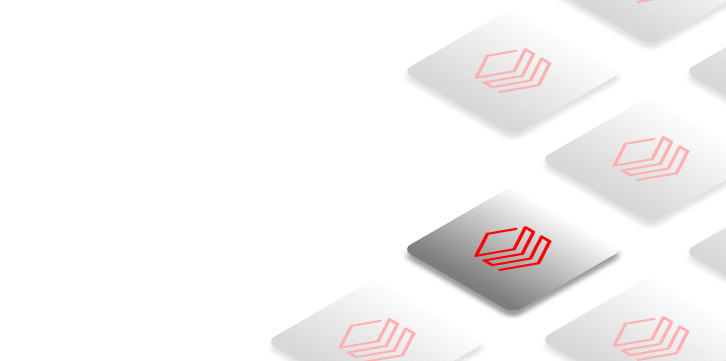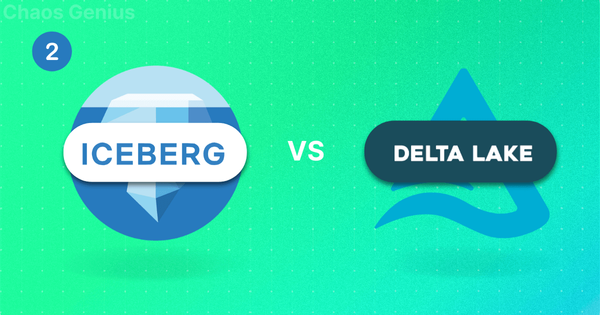In part one of Apache Iceberg vs Delta Lake we compared Apache Iceberg vs Delta Lake across origin, architecture, metadata management, query engine compatibility, and ACID transactions.
Now, in this second part, we’ll compare them on schema evolution, partition evolution, data skipping and indexing, performance, scalability, ecosystem, and use cases.
Schema Evolution—Apache Iceberg vs Delta Lake
Apache Iceberg
Apache Iceberg is great at schema evolution, allows adding, dropping, and reordering columns, and widening column types. These changes are stored in the metadata files so you can query historical data even after schema changes. This is critical for long-term data management as it avoids having to rewrite data files when schema changes happen.
Delta Lake
Delta Lake also supports schema evolution but it’s limited compared to Iceberg. It allows adding columns and widening column types but has restrictions on other types of changes. Schema changes in Delta Lake are stored in the delta log which tracks all changes to the table’s schema and data.
Save up to 50% on your Databricks spend in a few minutes!


Partition Evolution—Apache Iceberg vs Delta Lake
Apache Iceberg
One of the coolest features of Apache Iceberg is partition evolution. You can change the partitioning scheme of a table without having to rewrite the data. This is especially useful for large tables where repartitioning would be too expensive. Iceberg does this through its manifest files which store detailed metadata about the partitions and data files.
Delta Lake
Delta Lake has been working on partition evolution but it’s not as featureful or integrated as Iceberg’s. While recent versions have added some support, Apache Iceberg is still more advanced in this area.
Data Skipping and Indexing—Apache Iceberg vs Delta Lake
Both Apache Iceberg vs Delta Lake use data skipping to improve query performance but they do it in slightly different ways:
Apache Iceberg
Apache Iceberg stores statistics about each data file in the manifest files, including min/max values for columns and null counts. This allows the query engine to skip entire data files, and speed up the query. This distributed approach allows Iceberg to manage metadata more efficiently.
Delta Lake
Delta Lake also collects statistics and stores them in the delta log. These can be used for data skipping but the centralized nature of the delta log can make it less efficient than Iceberg’s distributed approach. Delta Lake relies on checkpoint files to summarize these statistics periodically which adds some overhead.
Performance and Scalability—Apache Iceberg vs Delta Lake
When comparing Apache Iceberg vs Delta Lake for performance and scalability, there are several key differences to consider, based on their architectures and feature sets.
Apache Iceberg Performance
- Metadata Management: Iceberg has great metadata management. By breaking down metadata into manifest files, manifest list files, and metadata files, Iceberg can plan and execute queries efficiently. This allows Iceberg to prune partitions well, which helps with query performance, especially for highly selective queries.
- Write Strategy: Iceberg's primary write strategy for updates and deletes is Copy-on-Write (CoW). In this approach, when data is modified, the affected data files are rewritten entirely. While this can lead to write amplification for frequent updates, reads are generally fast as they only process valid, non-overlapping data files. Iceberg also offers an optional Merge-on-Read (MoR) strategy, especially beneficial for streaming workloads or high write throughput, where changes are recorded as 'diffs' and merged at read time, though this can increase read complexity.
Delta Lake Performance
- Data Skipping and Compaction: Delta Lake has data skipping and automatic compaction. It categorizes data files by metadata to skip unnecessary data during queries. It also compacts small Parquet files into larger ones periodically, reducing the overhead of managing many small files and thus query performance.
- Write Strategy (Copy-on-Write): Delta Lake primarily uses a Copy-on-Write (CoW) strategy for updates and deletes, where modified data records result in new files being written, and old files are marked for removal. This approach ensures transactional consistency and simplifies read operations, as readers only see the latest, consistent version of the data. While it can lead to write amplification, Delta Lake's optimizations help manage this effectively.
Apache Iceberg Scalability
- Scalability: Apache Iceberg can handle petabyte-scale datasets easily, supports partition evolution and schema evolution without having to rewrite a lot of data. This makes Iceberg very scalable and can handle a lot of data without performance degradation.
- Flexibility: Apache Iceberg’s architecture can be used with various data processing engines and storage formats, Avro, ORC, and Parquet, so flexible in integration and scalability across different environments.
Delta Lake Scalability
- High Scalability: Delta Lake is known for its high scalability and reliability, good for large-scale data processing. It can handle complex operations and large datasets well, partly because of its robust transaction log and checkpointing mechanism which maintains data consistency and integrity.
- Compaction and Optimization: Delta Lake’s continuous optimization, auto-compaction and data skipping, helps it scale well. These ensures the data lake remains performant even as data grows.
Ecosystem and Community Support—Apache Iceberg vs Delta Lake
In the open source world, the strength of a project often lies in its community. Let’s take a look at the ecosystems surrounding Apache Iceberg vs Delta Lake.
Apache Iceberg—A Diverse Community
Since being adopted by the Apache Software Foundation, Apache Iceberg has grown its contributor base exponentially. What was a Netflix project now has contributors from many companies including:
The Iceberg community is open and collaborative. Regular community meetings, active mailing lists, and a welcoming attitude towards new contributors has created a thriving ecosystem around the project.
Delta Lake—Databricks-Led but Growing
Delta Lake’s community is growing but still heavily Databricks-led. This isn’t necessarily a bad thing – Databricks expertise has been instrumental in shaping Delta Lake. But it means the project’s direction is more tied to Databricks roadmap than Iceberg is to any one company.
But Delta Lake is building a more diverse community. IBM and Walmart have contributed to the project. Open sourcing has also opened the door for smaller companies and individual contributors to get involved.
One benefit of Delta Lake being Databricks-led is the availability of commercial support and tooling. For companies already in the Databricks ecosystem, this is a big plus.
Data Manipulation (DML Operations)—Apache Iceberg vs Delta Lake
Both Apache Iceberg and Delta Lake provide full Data Manipulation Language (DML) support, including INSERT, UPDATE, DELETE, and MERGE operations, enabling transactional capabilities directly on data lake storage.
Apache Iceberg
Iceberg supports INSERT INTO, MERGE INTO, and INSERT OVERWRITE statements. When executing UPDATE or DELETE operations, Iceberg primarily uses a Copy-on-Write (CoW) approach by default. This means if even a single row in a data file is modified or deleted, the entire data file is rewritten, and the new snapshot points to the rewritten file. For DELETE operations where an entire partition or set of files can be pruned by the filter, Iceberg can perform a metadata-only delete without rewriting data.
Iceberg also offers an optional Merge-on-Read (MoR) strategy for row-level updates and deletes. In MoR, instead of rewriting data files immediately, a "delete file" is generated to track which records need to be ignored (positional deletes) or which values have changed (equality deletes). This can reduce write amplification, particularly for frequent small updates or streaming workloads, but queries may incur additional overhead to merge data and delete files at read time. MERGE INTO operations are supported by rewriting affected data files in an overwrite commit.
Delta Lake
Delta Lake fully supports UPDATE, DELETE, and MERGE INTO operations, treating them as atomic transactions. For DELETE operations, Delta Lake first identifies data files containing rows that match the predicate. It then rewrites these files, excluding the deleted rows, and marks the old files as "tombstoned" in the transaction log. UPDATE operations follow a similar Copy-on-Write (CoW) mechanism: files containing updated rows are rewritten with the new values.
The MERGE INTO operation in Delta Lake is powerful, allowing for upserts (update or insert), deletes, and inserts based on join conditions between a source and target table. Delta Lake performs a two-step MERGE process: an inner join to identify files with matches, followed by an outer join to write out updated, deleted, or inserted data. Performance for these DML operations in Delta Lake can be optimized by adding more predicates to narrow down the search space, especially on partition columns.
Use Cases and Adoption—Apache Iceberg vs Delta Lake
Both Apache Iceberg vs Delta Lake aim to solve similar problems. But, their different approaches and strengths make them better for certain use cases. Let's explore some key considerations:
Apache Iceberg
Apache Iceberg is designed for big data management at scale, especially in the cloud. It shines in high-performance analytics and transactional consistency. Here are some use cases:
1) Transactional Data Lakes
As we have already mentioned, Apache Iceberg supports ACID transactions so it’s great for building transactional data lakes. It allows for reliable data ingestion and transformation with robust support for updates, deletes, and merges.
2) Data Versioning and Time Travel
It keeps historical versions of the data so you can do data versioning and time travel for auditing and compliance.
3) Incremental Processing
Apache Iceberg’s incremental processing helps with efficient ETL workflows by only processing the changed data, reducing compute cost and time.
4) Partition Evolution
Apache Iceberg allows for dynamic partitioning and evolution without hurting query performance which is great for large and evolving datasets.
Apache Iceberg is used across many industries because of its flexibility and support for multiple data processing engines. Notable users include Netflix (its original developer), Apple, LinkedIn, Airbnb and many more. The open source and community backing has led to its inclusion in multiple cloud platforms so it can be used in enterprise environments.
Delta Lake
Delta Lake by is all about reliability and performance for data lakes. It’s tightly integrated with Apache Spark so it’s great for:
1) Real-time Data Processing
Delta Lake’s ACID transactions and support for both batch and streaming data workloads means real-time data processing and analytics for modern data pipelines.
2) Data Warehousing
It has robust data warehousing capabilities with schema enforcement, data validation and indexing for high query performance and data integrity.
3) Unified Batch and Streaming
It supports both batch and real-time streaming data processing, making it suitable for real-time analytics and ETL pipelines.
4) Machine Learning Pipelines
Delta Lake’s integration with Databricks and Spark makes it easy to create and manage machine learning pipelines and data preparation and model training.
5) Data Lakehouse Architectures
Delta Lake supports the data lakehouse architecture combining the flexibility of data lakes with the performance and ACID transactions of data warehouses for diverse analytical workloads.
6) Time Travel and Data Versioning
Delta Lake allows time travel capabilities, enabling users to query historical data and rollback to previous versions, which is crucial for debugging and auditing purposes.
Delta Lake has seen wide adoption especially within Databricks users. Its tight integration with Spark makes it the choice for companies that need scalable and performant data lakes. The feature set and backing from Databricks is growing its adoption in data driven companies.
Choosing Between Apache Iceberg vs Delta Lake
You made it to the end! We’ve covered the similarities and differences between Apache Iceberg vs Delta Lake.
Now which one should you choose?
Use Apache Iceberg if:
- Your use case involves complex data types or rapidly evolving schemas.
- You need a vendor-neutral, community-driven solution that integrates with a wide range of technologies.
- Scalability and robust metadata management are priorities for your data architecture.
Use Delta Lake if:
- You require strict data consistency and versioning, along with time travel capabilities.
- High performance in data processing and query efficiency is crucial.
- You are deeply integrated into the Databricks ecosystem or require seamless integration with specific cloud platforms and big data tools.
Here is the overall summary:
| Feature | Apache Iceberg | Delta Lake |
|---|---|---|
| Origins | Developed by Netflix, now an Apache Software Foundation project | Developed by Databricks, now part of the Linux Foundation |
| Architecture | Three-tiered (Iceberg Catalog, Metadata Layer, Data Layer) | Delta Table, Delta Log, Cloud Object Storage Layer |
| File Format Support | Supports Parquet, Avro, ORC | Primarily uses Parquet |
| Ecosystem Fit | Works with multiple query engines (Spark, Flink, Presto, Hive, Impala) | Primarily optimized for Apache Spark, but expanding |
| Community and Governance | Community-driven with contributors from various companies (Apple, AWS, Alibaba) | Initially Databricks-led but growing (IBM, Walmart) |
| ACID Transactions | Metadata-based atomicity, optimistic concurrency control | Log-based atomicity, optimistic concurrency control |
| Schema Evolution | Supports adding, dropping, renaming columns seamlessly | Supports adding and widening columns, but limited in other changes |
| Partition Evolution | Dynamic partitioning and evolution without rewriting data | Limited support compared to Iceberg |
| Time Travel | Yes, allows querying old data versions | Yes, supports querying historical data |
| Metadata Management | Multi-layer metadata system, optimized for query planning | Centralized delta log with checkpoint files |
| Data Compaction | Advanced data compaction to reduce storage and speed up reads | Automatic compaction of small files into larger ones |
| Performance | Efficient metadata management, primarily Copy-on-Write (CoW) strategy (with optional Merge-on-Read for specific use cases) | Data skipping, primarily Copy-on-Write (CoW) strategy, continuous optimization, auto-compaction |
| Scalability | Handles petabyte scale datasets, supports partition and schema evolution | High scalability with robust transaction log and auto-compaction |
| Batch and Streaming Support | Works with batch processing engines | Supports both batch and streaming data |
| Data Manipulation (DML) | UPDATE, DELETE, MERGE via Copy-on-Write (CoW) by default, optional Merge-on-Read (MoR) for some operations | UPDATE, DELETE, MERGE via Copy-on-Write (CoW) |
| Advanced Features | Hidden partitioning, optimized metadata management | Delta Sharing, Delta Live Tables, schema enforcement |
| Industry Use Cases | Transactional data lakes, data versioning, incremental processing | Real-time data processing, data warehousing, machine learning pipelines |
| Adoption | Used by Netflix, Apple, LinkedIn, Airbnb, Bloomberg | Used by Shell, HSBC, Comcast |
| Commercial Support | Open-source with community support | Strong commercial support from Databricks |

Want to take Chaos Genius for a spin?
It takes less than 5 minutes.

Conclusion
And that's a wrap! Apache Iceberg and Delta Lake are both powerful open table formats for data lakehouses. Iceberg shines in schema evolution, complex data types, and vendor neutrality. Delta Lake excels in ACID compliance, performance optimization, and Databricks integration. Choose based on your project's specific requirements, existing ecosystem, and desired features.
FAQs
How does Apache Iceberg handle schema evolution?
Apache Iceberg allows adding, dropping, and reordering columns, and widening column types. These changes are stored in metadata files, enabling queries on historical data even after schema changes.
What are the limitations of Delta Lake in terms of schema evolution?
Delta Lake supports adding columns and widening column types but has restrictions on other types of changes. Schema changes are stored in the delta log.
What is the Delta Log in Delta Lake?
Delta Log is a transaction log that records every change to Delta Lake tables, ensuring data integrity and enabling features like time travel.
How does Apache Iceberg handle metadata management?
Apache Iceberg uses a three-tier metadata architecture consisting of the Iceberg catalog, metadata files, and data files.
What is partition evolution, and how does Apache Iceberg implement it?
Partition evolution allows changing the partitioning scheme of a table without rewriting data. Iceberg implements this through manifest files which store detailed metadata about partitions and data files.
How does Delta Lake handle data skipping?
Delta Lake uses data skipping by collecting statistics and storing them in the delta log, which can be used to skip unnecessary data during queries.
How does Apache Iceberg implement data skipping to improve query performance?
Iceberg stores statistics about each data file in manifest files, including min/max values for columns and null counts. This allows query engines to skip entire data files, speeding up queries.
What approach does Delta Lake use for data skipping?
Delta Lake collects statistics and stores them in the delta log. It uses checkpoint files to summarize these statistics periodically.
What is the key difference in metadata management between Apache Iceberg vs Delta Lake?
Iceberg uses a distributed approach with manifest files, while Delta Lake uses a centralized approach with the delta log.
What is the difference between merge-on-read and merge-on-write?
Merge-on-read (used by Iceberg) merges changes during read time, while merge-on-write (used by Delta Lake) writes changes to new files immediately.
What is merge-on-read, and which system uses this approach?
Merge-on-read is where read operations only fetch what's needed and changes are merged during read time. Apache Iceberg uses this approach.
Which query engines are compatible with Apache Iceberg?
Apache Iceberg is compatible with Apache Spark, Apache Flink, Presto/Trino, Apache Hive, Apache Impala, and Dremio.
What is Iceberg partitioning?
Iceberg partitioning uses hidden partitioning techniques that dynamically partition data based on query patterns and usage. This approach allows for efficient query performance, minimizing the amount of data scanned and reducing latency compared to traditional static partitioning methods
What is the difference between Iceberg partitioning and Hive partitioning?
Iceberg partitioning uses hidden partitioning, allowing dynamic partitioning without explicitly specifying partitions, leading to more efficient queries and reduced data scanning. However, Hive partitioning requires manual partition specification, which can be less flexible and slower for query performance due to extensive file listing operations.
How does Delta Lake ensure data durability?
Delta Lake inherits durability guarantees from the underlying storage system (like S3 or HDFS) and uses Parquet-formatted checkpoint files to preserve historical data changes.
How does Delta Lake's merge-on-write approach affect read and write performance?
Merge-on-write makes writes faster and more consistent but introduces some latency during reads.
How does Apache Iceberg handle scalability for large datasets?
Iceberg can handle petabyte-scale datasets, supports partition and schema evolution without extensive data rewriting, and works with various data processing engines and storage formats.
What features contribute to Delta Lake's scalability?
Delta Lake's scalability is supported by its robust transaction log, checkpointing mechanism, continuous optimization, auto-compaction, and data skipping.
Which companies are notable contributors to the Apache Iceberg project?
Notable contributors include Apple, Amazon Web Services, Alibaba, Dremio, Cloudera, LinkedIn and more.















































